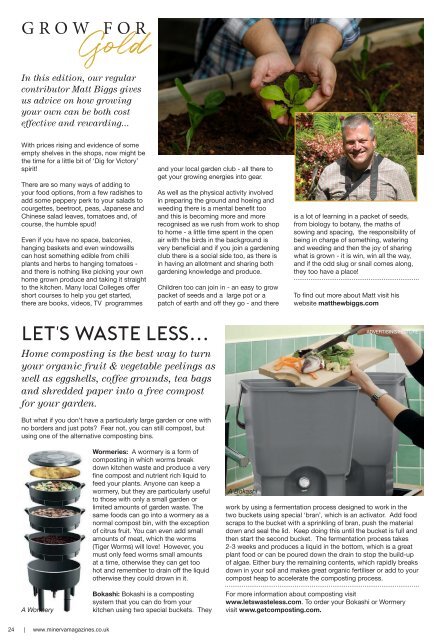Malvern Living Jul - Aug 2022
Summer is here – we’ve got an issue filled with sunshine! We’ve interviewed French chef Raymond Blanc, got some delicious recipes and are looking at all the ways to transform the home and garden in a few easy steps.
Summer is here – we’ve got an issue filled with sunshine! We’ve interviewed French chef Raymond Blanc, got some delicious recipes and are looking at all the ways to transform the home and garden in a few easy steps.
Create successful ePaper yourself
Turn your PDF publications into a flip-book with our unique Google optimized e-Paper software.
GROW FOR<br />
Gold<br />
In this edition, our regular<br />
contributor Matt Biggs gives<br />
us advice on how growing<br />
your own can be both cost<br />
effective and rewarding...<br />
With prices rising and evidence of some<br />
empty shelves in the shops, now might be<br />
the time for a little bit of ‘Dig for Victory’<br />
spirit!<br />
There are so many ways of adding to<br />
your food options, from a few radishes to<br />
add some peppery perk to your salads to<br />
courgettes, beetroot, peas, Japanese and<br />
Chinese salad leaves, tomatoes and, of<br />
course, the humble spud!<br />
Even if you have no space, balconies,<br />
hanging baskets and even windowsills<br />
can host something edible from chilli<br />
plants and herbs to hanging tomatoes -<br />
and there is nothing like picking your own<br />
home grown produce and taking it straight<br />
to the kitchen. Many local Colleges offer<br />
short courses to help you get started,<br />
there are books, videos, TV programmes<br />
and your local garden club - all there to<br />
get your growing energies into gear.<br />
As well as the physical activity involved<br />
in preparing the ground and hoeing and<br />
weeding there is a mental benefit too<br />
and this is becoming more and more<br />
recognised as we rush from work to shop<br />
to home - a little time spent in the open<br />
air with the birds in the background is<br />
very beneficial and if you join a gardening<br />
club there is a social side too, as there is<br />
in having an allotment and sharing both<br />
gardening knowledge and produce.<br />
Children too can join in - an easy to grow<br />
packet of seeds and a large pot or a<br />
patch of earth and off they go - and there<br />
is a lot of learning in a packet of seeds,<br />
from biology to botany, the maths of<br />
sowing and spacing, the responsibility of<br />
being in charge of something, watering<br />
and weeding and then the joy of sharing<br />
what is grown - it is win, win all the way,<br />
and if the odd slug or snail comes along,<br />
they too have a place!<br />
To find out more about Matt visit his<br />
website matthewbiggs.com<br />
let's waste less...<br />
Home composting is the best way to turn<br />
your organic fruit & vegetable peelings as<br />
well as eggshells, coffee grounds, tea bags<br />
and shredded paper into a free compost<br />
for your garden.<br />
ADVERTISING FEATURE<br />
But what if you don’t have a particularly large garden or one with<br />
no borders and just pots? Fear not, you can still compost, but<br />
using one of the alternative composting bins.<br />
A Wormery<br />
Wormeries: A wormery is a form of<br />
composting in which worms break<br />
down kitchen waste and produce a very<br />
fine compost and nutrient rich liquid to<br />
feed your plants. Anyone can keep a<br />
wormery, but they are particularly useful<br />
to those with only a small garden or<br />
limited amounts of garden waste. The<br />
same foods can go into a wormery as a<br />
normal compost bin, with the exception<br />
of citrus fruit. You can even add small<br />
amounts of meat, which the worms<br />
(Tiger Worms) will love! However, you<br />
must only feed worms small amounts<br />
at a time, otherwise they can get too<br />
hot and remember to drain off the liquid<br />
otherwise they could drown in it.<br />
Bokashi: Bokashi is a composting<br />
system that you can do from your<br />
kitchen using two special buckets. They<br />
A Bokashi<br />
work by using a fermentation process designed to work in the<br />
two buckets using special ‘bran’, which is an activator. Add food<br />
scraps to the bucket with a sprinkling of bran, push the material<br />
down and seal the lid. Keep doing this until the bucket is full and<br />
then start the second bucket. The fermentation process takes<br />
2-3 weeks and produces a liquid in the bottom, which is a great<br />
plant food or can be poured down the drain to stop the build-up<br />
of algae. Either bury the remaining contents, which rapidly breaks<br />
down in your soil and makes great organic fertiliser or add to your<br />
compost heap to accelerate the composting process.<br />
For more information about composting visit<br />
www.letswasteless.com. To order your Bokashi or Wormery<br />
visit www.getcomposting.com.<br />
24 | www.minervamagazines.co.uk


















